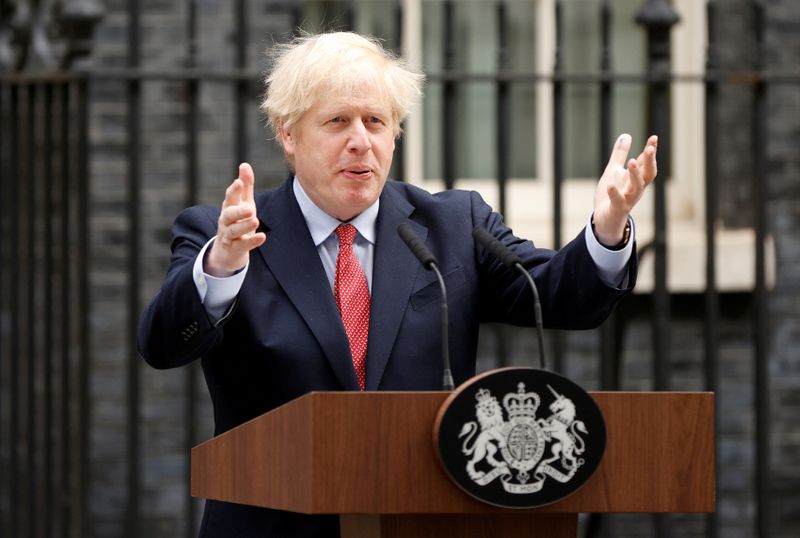By Guy Faulconbridge, Elizabeth Piper and Michael Holden
LONDON (Reuters) - When Boris Johnson caught COVID-19 in March, the overweight British prime minister tried to work through the illness "in denial" - but ended up wearing an oxygen mask in an intensive care unit and was ultimately out of action for almost a month.
He later said he had fought for his life as the state prepared for the unthinkable: the possible death in office of a prime minister.
Johnson's experience of trying to stay in charge while struggling with the disease may offer clues about the potential dangers ahead for U.S. President Donald Trump, now that he has tested positive.
After being accused of initially failing to appreciate the gravity of coronavirus crisis for Britain, Johnson, then 55, felt mild symptoms on March 26 while answering questions in the House of Commons chamber.
A few hours later, he received a positive test result, and the next day he made a video statement in which he said he was self-isolating, but would continue to work and lead Britain's coronavirus response.
But during the next nine days, as he worked in isolation in an apartment above his official Downing Street residence and office, his condition deteriorated, with persistent symptoms including a high temperature.
Later, he said he had been in denial and continued to work despite feeling groggy and "pretty rough", until doctors told him firmly to go to hospital.
Being a national leader has offered little protection against the new coronavirus.
Brazil's President Jair Bolsonaro spent weeks in quarantine after testing positive in July 7, and said he had taken antibiotics for an infection that left him feeling weak.
Honduran President Juan Orlando Hernandez needed hospital treatment, and former Italian prime minister Silvio Berlusconi developed double pneumonia and spent 10 days in hospital, being treated with the antiviral drug Remdesivir.
The 84-year-old was allowed home on Sept. 14 saying he had survived "the most dangerous challenge" of his life, and has made no public appearances since.
"THE BAD MOMENT"
Johnson's sudden deterioration after continuing to work may hold a warning for the 74-year-old Trump, now in full campaigning mode for the U.S. presidential election on Nov. 3.
Johnson was admitted to St Thomas’ Hospital in the evening of April 5. The next day he was moved to intensive care, where he received oxygen support but was not put on a ventilator.
"The bad moment came when it was 50-50 whether they were going to have to put a tube down my windpipe," Johnson said later.
"The doctors had all sorts of arrangements for what to do if things went badly wrong ... The bloody indicators kept going in the wrong direction."
He later said he owed those doctors his life.
While Johnson was ill, his duties were assumed by Foreign Secretary Dominic Raab.
"They had a strategy to deal with a 'death of Stalin'-type scenario," Johnson later said. "It was a tough old moment, I won’t deny it."
Johnson left hospital on April 12, but continued his recuperation at his official country residence northwest of London, and did not return to work until April 27 - a month after announcing that he had tested positive.
When Johnson's fiancée Carrie Symonds gave birth to their son two days later, he was given a middle name of Nicholas partly in tribute to two of the intensive care doctors who had treated the prime minister.
Since then, Johnson has repeatedly dismissed concerns about his recovery, and said the virus has convinced him to slim down from his previous, portly 17st 6lb (244 lb, 112 kg).

As recently as Tuesday, he told a reporter: "I'm fitter than I was before, it may irritate you to know ... I'm fit as a butcher's dog, thanks basically to losing weight."